|
|
|
Sort Order |
|
|
|
Items / Page
|
|
|
|
|
|
|
| Srl | Item |
| 1 |
ID:
172185
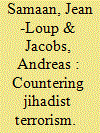

|
|
|
|
|
| Summary/Abstract |
As France and Germany have become major targets of jihadist terrorism, the calls for stronger cooperation in counterterrorism at the European level have grown in earnest. However, a comparative analysis of the national experiences from both countries evidences significant differences in terms of political culture, institutional division of labor, and legal oversight. Counterterrorism practices can be described following a typology of three broad categories: a military-oriented policy that aims to prevent, deter and retaliate against terrorists; a regulatory policy that strengthens the legal and judicial resources to address the terrorist threat; a diplomatic approach that focuses on negotiations, and sometimes accommodation. Whereas France moved after the 2015 attacks towards a military-oriented policy, Germany has so far opted to sustain its traditional regulatory approach. This article details the differences between Paris and Berlin regarding the contemporary public debate on jihadist terrorism, to the law enforcement framework, to the deradicalization programs as well as to the role of armed forces. The paper identifies a clear divergence in each of these sectors. As the future extent of bi- and multilateral lateral efforts in the field of counterterrorism are likely to rise, these differences should be better taken into account.
|
|
|
|
|
|
|
|
|
|
|
|
|
|
|
|
| 2 |
ID:
100631
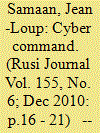

|
|
|
|
|
| Publication |
2010.
|
| Summary/Abstract |
US efforts to develop a coherent cyber-strategy have foundered because of a fundamental divide in the interpretation of the conduct of cyber-warfare. Yet both sides of this intellectual rift could be in the wrong. As such, cyberspace does not lend itself to analogies with other strategic experiences. Instead, cyber-operations should be seen as augmenting military capability in the joint campaign.
|
|
|
|
|
|
|
|
|
|
|
|
|
|
|
|
| 3 |
ID:
122942
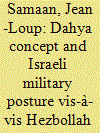

|
|
|
|
|
| Publication |
2013.
|
| Summary/Abstract |
Since 2008, the Dahya concept has been portrayed by journalists, independent experts, and scholars as an official policy of Israel to address the threat of Hezbollah in Lebanon. However, there has been no official Israeli document formulating a Dahya strategy. Although this Dahya concept is not officially endorsed by the Israeli Defense Forces, it is a key reflection of the state of the Israeli military vis-à-vis Hezbollah debate since the 2006 war. This debate reflects a significant evolution of Israeli threat assessment and the remedies for these challenges. It acknowledges not only the political support and military strength of the Lebanese organization, but also its rationality. Conceding the extreme difficulty of dismembering Hezbollah's power, the Dahya concept postulates a deterrence system that, as a matter of fact, finds its roots in traditional Israeli strategic doctrine.
|
|
|
|
|
|
|
|
|
|
|
|
|
|
|
|
| 4 |
ID:
092488
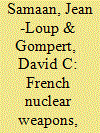

|
|
|
|
|
| Publication |
2009.
|
| Summary/Abstract |
Changes in French nuclear weapons policy are in the air. In 2006, President Chirac proposed that France expand the purpose of nuclear deterrence beyond defending French territory to include protecting France's European allies(Euro-deterrence); securing certain vital French interests, such as oil supplies; and holding at risk states that support terrorism.
|
|
|
|
|
|
|
|
|
|
|
|
|
|
|
|
| 5 |
ID:
187317
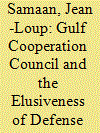

|
|
|
|
|
| Summary/Abstract |
The 2017–21 blockade of Qatar has frequently been depicted as the largest obstacle to further cooperation within the Gulf Cooperation Council. However, this narrative overestimates the impact of the dispute and underestimates the historical limitations of the GCC and its multilateral projects prior to the crisis. GCC initiatives rarely produced tangible results, even before 2017, because their primary function was at the rhetorical level for Gulf Arab rulers, providing them with narratives of apparent regional unity rather than with concrete instruments of cooperation.
|
|
|
|
|
|
|
|
|
|
|
|
|
|
|
|
| 6 |
ID:
114963
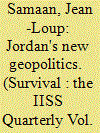

|
|
|
|
|
| Publication |
2012.
|
| Summary/Abstract |
With revolutions in Tunisia and Egypt, NATO's intervention against the Muammar Gadhafi regime in Libya and the unfolding civil war in Syria, the Kingdom of Jordan faces a dramatically altered strategic landscape. The kingdom has not been immune to the upheavals, having seen repeated protests since December 2010 on a scale not experienced for several decades.
|
|
|
|
|
|
|
|
|
|
|
|
|
|
|
|
| 7 |
ID:
153060
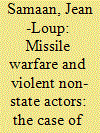

|
|
|
|
|
| Summary/Abstract |
Over the last three decades, Hezbollah adapted its military strategy and the operational function conferred to its missiles. Starting in 1992, rocket warfare became one of the primary tactics of the group to compel Israeli Forces in Lebanon. After the Israeli withdrawal in 2000, the strategy evolved into a deterrence posture to support the Party’s objective to remain the primary military power inside Lebanon. Hezbollah’s posture could serve as a template for smaller terrorist groups. It would broaden the array of strategic options for violent non-state actors, allowing them to implement military postures that could be described as rudimentary and low-cost denial of access strategies. However, this scenario would require the same level of state support that Hezbollah currently enjoys from Iran, and that other non-state actors (Hamas, Houthi insurgents) do not at this stage.
|
|
|
|
|
|
|
|
|
|
|
|
|
|
|
|
| 8 |
ID:
163644
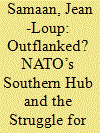

|
|
|
|
|
| Summary/Abstract |
Following the rise of the Islamic State in 2014, the Atlantic Alliance engaged in an ambitious political revision of its policies towards the Middle East, which led to the creation of the NATO Strategic Direction South Hub. However, this new policy was only marginally the product of a threat-driven strategy; rather it was the result of two factors. Specifically, it responded to a political need in NATO Headquarters and the capitals of member states, particularly in Southern Europe countries, to acknowledge the latest security challenges in the Middle East and to offer a policy more balanced between NATO missions to the East, namely vis-à-vis Russia’s policies in its neighbourhood, and those in the South. The Hub also provided the Joint Forces Command – Naples with a strong mission within the NATO bureaucracy. Nevertheless, the limitations of the project with respect to the Alliance’s other political priorities indicate that this institutionalisation of a new organisation within NATO did not overcome the ambiguities of the Alliance’s posture towards the region, but rather reflected them.
|
|
|
|
|
|
|
|
|
|
|
|
|
|
|
|
| 9 |
ID:
126003
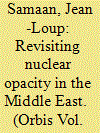

|
|
|
|
|
| Publication |
2013.
|
| Summary/Abstract |
This article explores a scenario of extended nuclear opacity in the Middle East that would comprise two undeclared nuclear powers: Iran and Israel. We argue that this regional spread of nuclear opacity would act as a major driver of instability in terms of conflict prevention and non- proliferation efforts. In both cases, it would demand a profound reevaluation of security policies conducted by Western countries and their allies in the region. Extended nuclear opacity in the Middle East would mean no communication channels, and no declaratory policies. It would entail no information on security perceptions, doctrines, capabilities, or targeting policies. This scenario of nuclear opacity is worth exploring as it brings new light to several critical issues in security studies. In particular it re-emphasizes a feature sometimes considered too casually which is that deterrence, if it ever is working, is not a natural state. It is socially situated and needs solid prerequisites, among them a certain level of transparency and communication. It also offers a new perspective on the logic of "nuclear hedging" and it revives the question of security guarantees from external powers as relevant means to balance threats.
|
|
|
|
|
|
|
|
|
|
|
|
|
|
|
|
| 10 |
ID:
103430
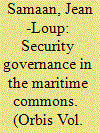

|
|
|
|
|
|
|
|